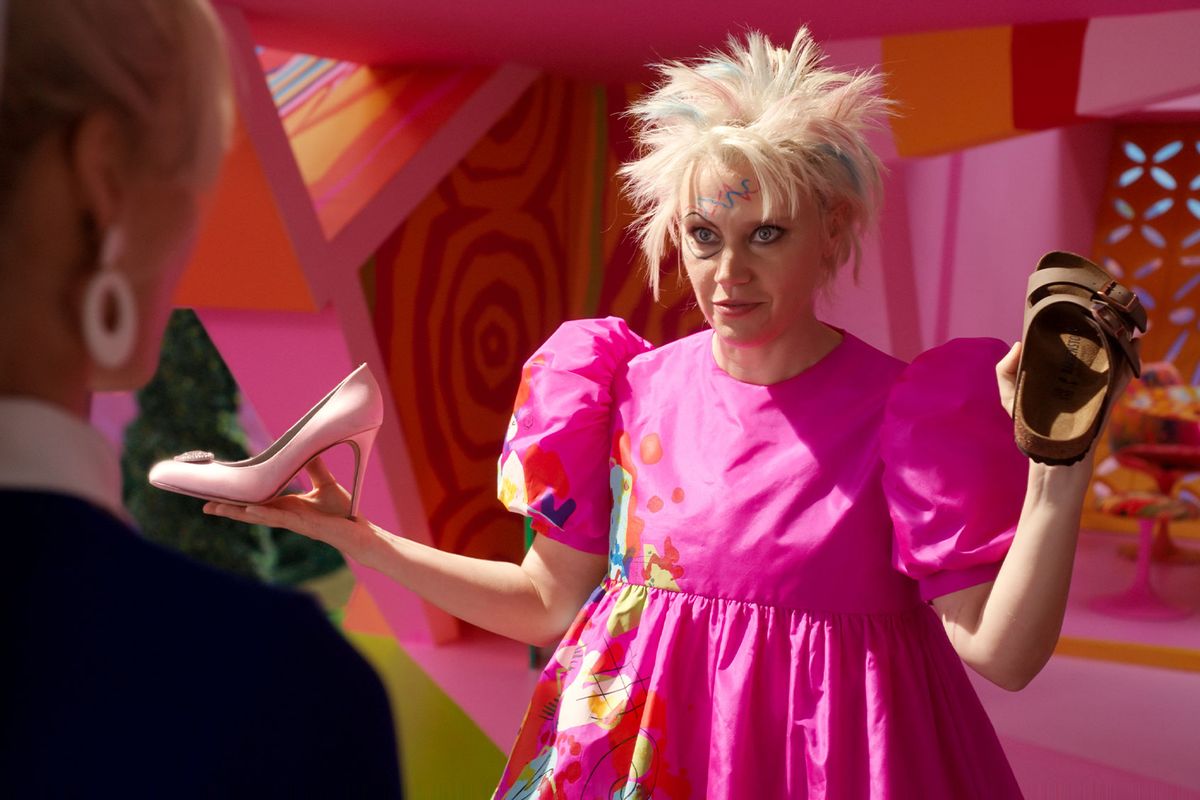As if we haven't had enough "Barbie" overload, Mattel is going to start selling Weird Barbie to cash in on the hype. I know, weird.
The toy company recently announced on its Facebook page the newest iteration of Barbie will launch on Aug. 18 (pre-order her now!) after the movie's wildly successful first month in theaters. Weird Barbie is based on Kate McKinnon's portrayal of the doll in Greta Gerwig's blockbuster.
Weird Barbie tends to do the splits a lot.
In the film, when Stereotypical Barbie (Margot Robbie) begins to lose her doll-like features – walking on horribly flat feet and harboring dreadfully existential thoughts – the other Barbies send her on a journey to seek advice from someone who understand imperfection. Enter Weird Barbie (McKinnon), an outcast who has the wisdom because well, she's a weirdo.
The lore surrounding Weird Barbie's creation is fascinating because she's only Weird Barbie as a result of her owner's . . . more creative alterations, as kids often do. Weird Barbie sports short, pink punky hair (cut in a raggedy mess by a child hairdresser), wears a poofy fuchsia dress with ugly scribbles all over it and matching child-like scribbles around her eyes. She tends to randomly do the splits a lot.
Weird Barbie also serves as a guide teaching Barbie about the harsh realities of life (permanent flat feet and Birkenstocks) and how she can leave Barbieland and journey into the real world to fix all of Barbie's more human faults. Weird Barbie is one of the only Barbies with real consciousness about the role she plays in Barbieland. She is willfully aware she is an outsider in this toy world of perfection.
Naturally, it makes a lot of sense why Mattel is selling a Weird Barbie. The movie has just crossed a billion-dollar box office within less than a month of release and it's a cultural hit regardless of age, gender and race. "Barbie" is a success and of course, it was going to be with its pricey global marketing campaign and all the Barbie collaborations with a plethora of popular businesses.
Weird Barbie's whole aesthetic is that she is custom-made by her owner.
But it does not make sense from a Weird Barbie perspective. I think Weird Barbie herself would probably even reject the notion of being sold to millions, going mainstream and popular. Weird Barbie is a weird girl. She flourishes in her irregularity — I mean she literally does random splits because she can or because her owner makes her do them! She's punk rock and there's nothing punk rock about selling out to Mattel.
We need your help to stay independent
Also, Weird Barbie's whole aesthetic is that she is custom-made by her owner, who is fully responsible for how she looks. Whether that means chopping off all her hair, scribbling all over her plastic body, or changing her clothes from fast fashion to a trash bag — that is how Weird Barbie is made. She isn't mass-produced in a factory to be sold in a Target or on Amazon. She purposefully exists as an original — one that stands out and is ostracized from the mass-produced Stereotypical Barbie. She is personal to her owner because her existence hinges on the owner's creativity and impulsiveness.
Mattel's capitalistic urge to monetize one of the original aspects of "Barbie" defeats the doll's entire purpose and symbolism in the film. Weird Barbie's character represents a personal relationship that a doll has with its owner — she only exists because she's been created by her owner. This is the type of wacky, uniqueness you can't really sell. If you really want your own Weird Barbie, make your own and have her be 100 percent original, unlike the movie character or any other Barbie. (Or, if you're going to buy a movie-inspired doll, where's our reissued Allan?)
Sadly, this move from Mattel just stresses that whatever's original about us weird girls is also marketable too. Nothing is original, everything is up for sale — even the weirdest of Barbies.



Shares